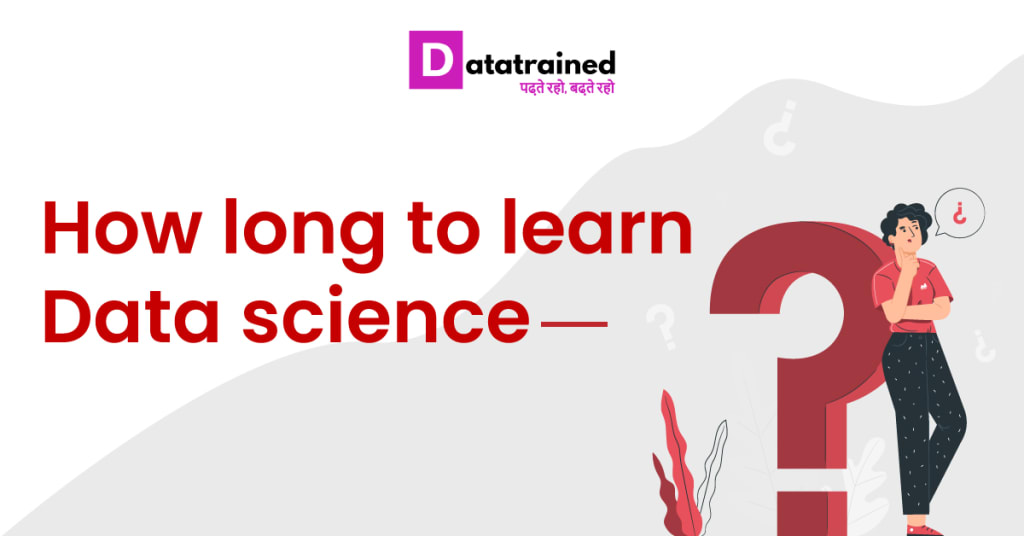
Introduction
Data science is the type of area you should explore if you enjoy the amount of data produced nowadays and want to discover real-world, data-driven activities you can do. But first, you need to determine where you are in your data science learning path and what skills you will need to reach your professional goals.
To say specialists working in data science provide you with several ideas and options is, to put it mildly. While it is true that you will not learn everything in a day or even within just a few months, it is not an impossibility.
However, when someone tells you that you must know everything, do not become disheartened. Instead, stay positive and believe that everything, from the foundations to programming, machine learning, statistics, database technologies, and several other highly specialised technologies, is attainable.
Everything relies on how quickly you can learn and how ready you are for the amount of time and effort you are willing to learn a data science certification course for beginners as initiated by DataTrained.
When deciding whether or not to learn data science, let's look at what kind of job titles you may hope to have after completing your course of study. Before you start your hunt for the data science online course with placement assistance provided by DataTrained.
These three professional roles — which are frequently discussed as the “big three” in data science — are defined as the Data Analyst, Data Engineer, and Data Scientist. Let's see what it takes to be a qualified applicant for this position.
Data analysis specialist
Although “entry-level” is an apt description of the position of many data scientists, it does not mean that all of them are still in the early stages of their careers. Salary levels vary greatly dependent on the level of experience you have and the kind of job you do.
It's easy to see why this programme is frequently listed as a great learning resource for data science students. Therefore having the best Data science courses and placement with a decent package is always a long road, but not in this case comparatively.
As a data analyst, you will mostly be researching data from your organisation or industry, evaluating it, and drawing insights that aid business choices. One example is when you are requested to go at the results of a current marketing campaign to see how efficient it is and to discover where the campaign's strengths and flaws are.
This project involves getting access to the data, cleaning it, and conducting statistical analysis to answer related business questions and conclusions.
Because you'll spend time working on multiple teams, you may need to work with different people over time. So, you might aid the firm CEO in discovering factors to what extent the company's expansion plans went well (or poorly) by analysing data for one month. In the following month, you will be analysing marketing statistics.
Data scientists who regularly discover intriguing patterns on their own and forecast future results generally do their job differently.
The fundamental abilities required to handle the role of a data analyst include:
The use of popular packages is also necessary for intermediate data science programming. cleaning up data normal-to-complex SQL queries The concept of probability and statistics visualisation of data
Also, you will need to have excellent communication skills to clearly and simply explain complex data analysis to those who don't have any programming or statistical experience.
When you think about your future in the job market as a data analyst after learning data science, you will have a wide variety of opportunities ahead of you. A significant percentage of those who work in this sector employ their data science abilities, most often through machine learning, to ease their introduction into a data scientist position.
In the unlikely event, if you are interested in data infrastructure, software development, and so on, you may aspire to work as a data engineer. Thus, it makes sense to study data science after gaining hands-on experience as a data analyst.
Data Scientist
This job profile requires more extraordinary programming and software development abilities but requires fewer statistical analysis skills, and it incorporates a broad mix of talents.
As a data engineer, it is your role to build pipelines that move data rapidly and in a useable manner, from marketing, sales, and revenue sources to data scientists and data analysts. You will also be needed to keep and retrieve existing data rapidly.
The required abilities and abilities you will have when employed in this role include:
Python helps to work with large datasets and develop data pipelines because of its extensive programming abilities. the ability to utilise advanced SQL features (and possibly knowledge of Postgres)
If you want to further your career, look at your skillset and experience and explore how you can transition into other software development specialisations. In the not-too-distant future, you could take on a leadership role as the head of the data engineering team.
Data scientists
According to this concept, data scientists have the most desirable job with a generous salary, which is why a significant portion of those who learn data science hopes to become a data scientist. Your job is to do several activities, and these task data analysts are already performing, such as acquiring, cleaning, and displaying data.
However, you will also often create machine learning models to use previous data to make exact predictions. Once you've completed your data science training and land a job as a data scientist, you will have a lot more freedom in your job role than those in other occupations who perform similar work.
You will need both the abilities of a data analyst and a statistician, with these talents of your own:
Unsupervised machine learning and supervised machine learning both have excellent comprehension. It's important to have good programming abilities in Python or R (and preferably, familiarity with other tools such as Apache Spark), The skill of analysing statistical models and a good foundation in statistics.
According to the current job market, when you consider your career expectations, you may begin as a junior data scientist and then work your way up to a senior data scientist or go into a different specialised sector and become a machine learning engineer. More than half of all people who choose to learn data science want a substantial salary rise was resulting, which means that many choose to learn data science and use it as a stepping stone to a more lucrative profession.
One job you may think of that could have a managerial bent is that of the chief data officer, data scientist, or something similar. Trial and error are necessary to master data science so that you can obtain a good job.
Here is a plan to help you study data science and begin a successful career in this industry.
An essential skill that you will require is no time like the present to learn the grammar of Python. One of the things you should focus on in your effort to master data science is figuring out methods to execute a Python programme in multiple ways.
Completing linear algebra and statistics prepares you for further study in data science. If you already have a firm grasp of these areas, you can learn the core principles in a few days. Don't forget to focus on descriptive statistics since it's pretty important to understand data collection. If your sole objective is to obtain a great career as a data scientist, then you absolutely must have a strong understanding of linear algebra and statistics.
Learn how to work with, retrieve, and display data with Pandas, Numpy, and Matplotlib. You'll need to have a thorough understanding of these libraries if you want to excel in your projects. Initially, you must study and understand machine learning algorithms.
Only when you have mastered this foundation can you begin to apply machine learning principles to actual-world problems. Once you've learned data science, you'll have to start solving real-world problems with data. Successfully and comfortably doing this activity will require training in computing resource usage.
If you already know the essentials, you may even consider enrolling in boot camps that will provide you with a range of different training modules to help you prepare for a job.





Comments
There are no comments for this story
Be the first to respond and start the conversation.